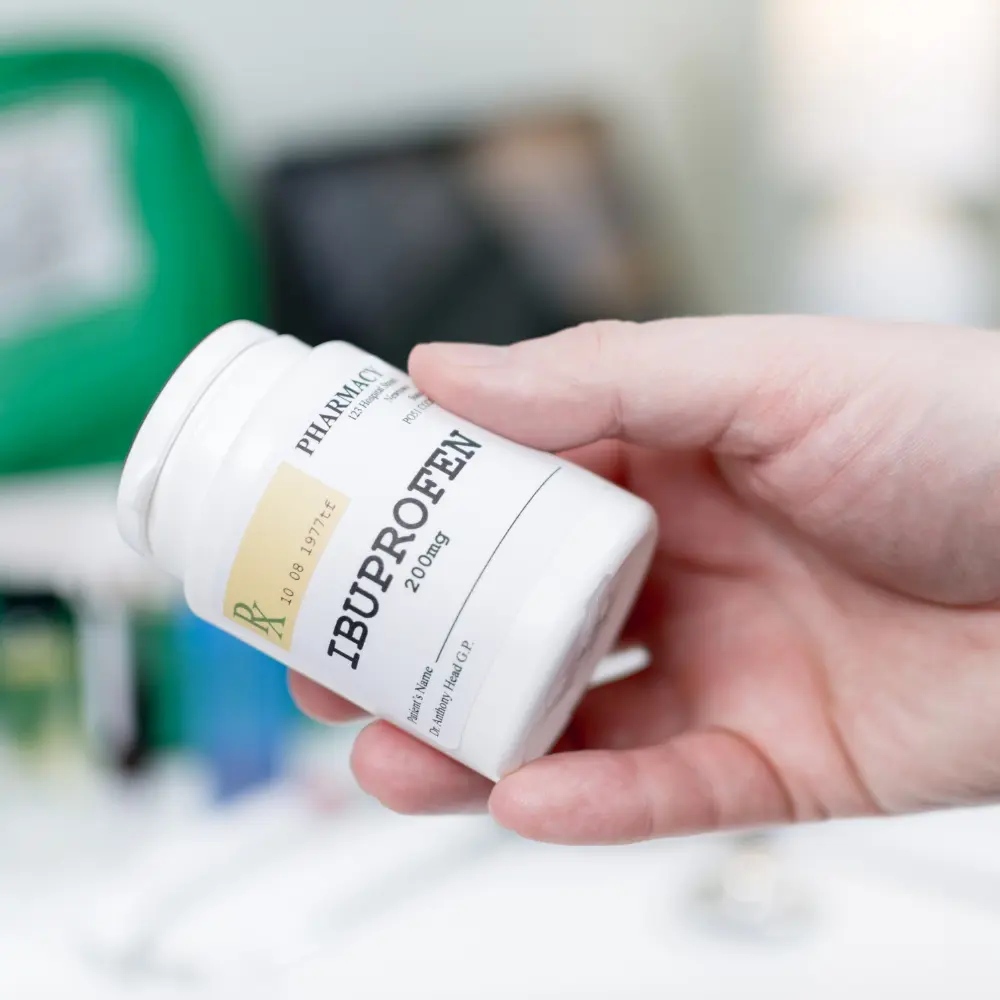For countless people worldwide, their daily routine involves the stimulating buzz of coffee and, when needed, the relieving aid of ibuprofen or, alternatively, Naproxen. These substances, prevalent in many homes, present a complex dynamic that often goes unnoticed. As we explore the intriguing intersection between ibuprofen and coffee, we unravel the scientific narratives that underpin their interactions and the potential effects on our health. Armed with expert insights and the latest research, this exploration illuminates the complexities of these common substances, transforming our understanding of their roles in our daily lives. So, buckle up for a journey that may reshape your perception of your morning brew and your go-to painkiller.
Ibuprofen and Coffee: Key Takeaway
- Understanding Individual Effects: Ibuprofen, known as Advil, is a nonsteroidal anti-inflammatory drug (NSAID) widely used for pain relief, while coffee is a popular beverage with stimulant properties. Both have their benefits and potential side effects, which can be amplified when used in conjunction.
- Interactions between Ibuprofen and Coffee: The consumption of ibuprofen with coffee may lead to faster absorption of the painkiller, but it can also potentially increase the risk of stomach discomfort. It’s crucial to pay attention to how your body responds to this combination.
- Interactions with Other Painkillers: It’s essential to understand how coffee interacts not only with ibuprofen but with other painkillers as well. Each medication can have different effects and potential interactions that need to be considered.
- Considerations for Responsible Consumption: Dosage guidelines, the timing of intake, and individual health conditions should all be taken into account when consuming ibuprofen and coffee. Safe consumption involves moderation and adherence to recommended guidelines.
- Exploring Alternatives and Complementary Approaches: There are natural alternatives to ibuprofen for pain relief, as well as caffeine-free substitutes for coffee. Additionally, lifestyle changes and complementary therapies can provide alternative approaches to managing pain and boosting energy.
Understanding Ibuprofen: Uses and Side Effects
Before delving into the complexities of the interaction between ibuprofen and coffee, it’s vital to fully understand ibuprofen itself: what it is, its common uses, and the potential side effects. As a staple in many medicine cabinets, ibuprofen has a variety of applications. However, like any medication, it also comes with certain precautions that users should be aware of. In the following sections, we will explore these aspects in detail to provide a comprehensive understanding of ibuprofen.
What is ibuprofen and how does it work?

Ibuprofen, often recognized by the brand name Advil, is a type of non-steroidal anti-inflammatory drug (NSAID). It works by inhibiting the production of prostaglandins, substances in the body that cause inflammation and pain. Specifically, ibuprofen blocks the enzyme that makes prostaglandins (cyclooxygenase), resulting in lower levels of these substances and, consequently, less inflammation and pain. (1)
Common Uses of Ibuprofen

Ibuprofen is a widely used over-the-counter medication for managing various types of discomfort. Below are some of its most common applications:
- Pain Relief: Ibuprofen is often used to alleviate general aches and pains, including headaches, toothaches, back pain, and menstrual cramps.
- Inflammation Reduction: Due to its anti-inflammatory properties, ibuprofen is used to treat conditions like arthritis, sprains, and strains.
- Fever Reducer: Ibuprofen can help lower a fever, making it a go-to choice for individuals battling the flu or common cold.
It’s worth noting that while ibuprofen is commonly used to manage these conditions, it does not cure them. It merely alleviates the symptoms, making the condition more bearable for the person.
Common side effects and precautions of ibuprofen

Like any medication, ibuprofen is not without its potential side effects. Most people who use ibuprofen do not experience severe adverse reactions. However, some common side effects include:
- Nausea or vomiting
- Constipation or diarrhea
- Gas or bloating
- Dizziness or headaches
More serious, but less common side effects could involve:
- Stomach ulcers or bleeding
- High blood pressure
- Fluid retention and swelling
- Kidney or liver problems
To minimize the risk of these side effects, it is crucial to take ibuprofen as directed by a healthcare professional or as per the instructions on the label. And while you might be tempted to have a cup of coffee to counteract the drowsiness or fatigue sometimes associated with ibuprofen, it’s important to consider how Advil and coffee might interact, a topic that we will explore later in this guide.
Delving into Coffee: Benefits and Concerns
Coffee is more than just a beverage; it’s a ritual, a wake-up call, and for many, an essential part of the day. Despite being a staple in our daily lives, it’s worth considering what it does to our body, particularly the central nervous system. Let’s dive deeper into the role of coffee in our lives and its impact on our health.
The Role of Coffee in Our Daily Lives

Coffee, steeped in centuries of history, has become an integral part of our social and personal lives. With its rich aroma and unmistakable flavor, coffee serves multiple roles:
- Social Connector: Coffee shops have long been meeting spots for friends, dates, and business discussions, demonstrating coffee’s social significance.
- Energy Booster: The caffeine in coffee makes it a popular choice for an energy kickstart, helping us shake off morning grogginess or combat afternoon slumps.
- Culinary Delight: Coffee is not just a drink, but also a versatile ingredient used in many recipes, from sweet desserts to savory dishes.
How does coffee affect the central nervous system?
Caffeine, the primary active component in coffee, has a profound impact on the central nervous system. Upon consumption, it blocks the action of adenosine, a neurotransmitter in the brain that promotes sleep and relaxation. By doing so, caffeine increases alertness and reduces the perception of fatigue.
Moreover, caffeine stimulates certain parts of the brain to increase dopamine production, a neurotransmitter that plays a role in feelings of pleasure and reward. This can enhance mood and cognitive function, contributing to why many people feel more focused and upbeat after a cup of coffee. (2)
Coffee’s role as a stimulant and diuretic

Beyond the cognitive boost, caffeine acts as a stimulant in other parts of the body. For instance, it can increase heart rate, blood pressure, and stomach acid production, which is why excessive intake might lead to palpitations, hypertension, or digestive discomfort.
Furthermore, coffee serves as a mild diuretic, promoting fluid excretion through the kidneys. While this doesn’t typically cause dehydration, it can lead to an increased frequency of urination. Therefore, individuals with conditions such as kidney disease or those who are prone to urinary incontinence should be cautious with their coffee consumption.
Through this examination, we can see that coffee, while a cherished part of our routines, comes with its own set of effects and considerations, warranting mindful consumption.
Potential Health Benefits and Risks of Coffee Consumption

While coffee is most famous for its invigorating effects, research suggests that its impact on our health extends beyond simply warding off sleepiness. Here, we delve into the potential health benefits and risks associated with regular coffee consumption.
Benefits of Coffee:
- Cognitive Health: Studies suggest that moderate coffee consumption can improve cognitive function and decrease the risk of neurodegenerative diseases like Alzheimer’s and Parkinson’s.
- Metabolic Effects: Coffee consumption has been associated with a lower risk of type 2 diabetes. This is possibly due to its influence on insulin sensitivity and glucose metabolism.
- Antioxidant Source: Coffee is rich in antioxidants, which help protect cells against damage from free radicals.
- Liver Health: Research indicates that coffee might protect against certain liver conditions, including cirrhosis and liver cancer.
Risks and Considerations:
While coffee can confer various health benefits, it’s also essential to consider potential risks, particularly when consumed in excess.
- Sleep Disruption: The stimulating effects of caffeine can interfere with sleep patterns, leading to insomnia or poor sleep quality.
- Digestive Issues: High coffee consumption can stimulate the production of stomach acid, potentially leading to acid reflux or aggravating existing gastrointestinal issues.
- Cardiovascular Impact: Although the link between coffee and heart health is complex and not fully understood, some studies suggest that excessive coffee intake might contribute to elevated blood pressure or irregular heart rhythms.
- Pregnancy Concerns: High levels of caffeine intake are not recommended during pregnancy due to potential adverse effects on fetal development.
Remember, while coffee can be part of a healthy diet, it’s not a substitute for a balanced, nutrient-rich diet and a healthy lifestyle. Always consider individual health conditions, genetic predispositions, and consult with healthcare professionals when necessary.
Interactions Between Ibuprofen and Coffee
As two commonly used substances, the interaction between ibuprofen and coffee is an important topic of interest. While they may seem unrelated, the fact is they can interact in several ways, impacting the effectiveness of the medication and the way our bodies process it. Here, we delve into these interactions.
How Does Ibuprofen React with Caffeine?

Caffeine and ibuprofen might seem like a harmless combination, but there is a level of interaction between them. Interestingly, some over-the-counter medications intentionally include caffeine because they can enhance the pain-relieving effect of analgesics like ibuprofen.
However, caffeine, being a stimulant, can also raise heart rate and blood pressure, and if combined with ibuprofen, it might intensify potential side effects like gastric discomfort or hypertension. It’s essential to take note of this interaction and use both substances responsibly.
The Impact of Coffee on Ibuprofen’s Efficacy
The caffeine in coffee might affect how your body absorbs and metabolizes ibuprofen. Some studies suggest that caffeine may increase the rate at which your body absorbs ibuprofen, which could result in a more rapid onset of relief but might also lead to an increased potential for side effects.
Conversely, coffee’s diuretic effect might alter the body’s hydration levels, potentially affecting how medications are metabolized and excreted. However, more research is needed in this area to draw definitive conclusions.
Possible interactions between caffeine and ibuprofen in the liver

Both caffeine and ibuprofen are metabolized in the liver. While they are processed through different enzymatic pathways, there’s potential for interaction if these pathways are overwhelmed. For instance, consuming large quantities of coffee could lead to an overworked liver, potentially slowing down the metabolism of ibuprofen.
This scenario could, in theory, prolong the effects of ibuprofen and increase the risk of adverse effects. However, it’s worth noting that such interactions are more likely with excessive coffee drinking or high-dose ibuprofen usage. As always, moderation and following recommended dosages are key.
Can coffee enhance or reduce the pain-relieving effects of ibuprofen?
Caffeine and ibuprofen exhibit an interesting interplay when it comes to pain relief. Some studies have shown that caffeine can potentiate the analgesic effects of ibuprofen. This could be why certain over-the-counter medications combine these two substances, aiming to optimize pain relief.
The mechanism behind this enhancement isn’t fully understood, but it’s thought that caffeine might help the body absorb ibuprofen more quickly, speeding up the onset of relief. Moreover, caffeine’s own ability to narrow the blood vessels might add to the pain-relieving effect, particularly for headaches and migraines.
However, it’s worth noting that these findings don’t necessarily mean one should start combining ibuprofen and coffee at home. Factors such as individual health conditions, caffeine sensitivity, and dosage must be taken into account. Always consult a healthcare provider before modifying medication routines.
Potential Risks and Complications of Mixing Ibuprofen and Coffee

Combining ibuprofen and coffee isn’t typically dangerous for most individuals, especially when both substances are used in moderation. However, certain risks and complications should be considered:
- Increased Stomach Discomfort: Both coffee and ibuprofen can cause gastric irritation. When combined, they might increase the risk of issues such as heartburn, stomach ulcers, or gastritis.
- Dehydration: Coffee’s diuretic properties, combined with possible fluid loss due to ibuprofen (especially in cases of fever), could potentially lead to dehydration.
- Cardiovascular Strain: Caffeine’s stimulatory effects on heart rate and blood pressure could potentially intensify if combined with ibuprofen, particularly in those with existing heart conditions.
- Impaired Drug Metabolism: As both substances are metabolized in the liver, there’s a small risk that heavy coffee consumption could affect how the body processes ibuprofen.
While these risks might sound alarming, remember that they’re more likely with excessive use or in individuals with certain health conditions. As with any substance, the key is responsible use. Always consult a healthcare provider if unsure about interactions between medication and dietary habits.
Considerations for Responsible Consumption
When it comes to taking medications like ibuprofen and consuming stimulants like coffee, responsible usage is paramount. Understanding the recommended dosages, as well as considering personal health conditions, can help ensure you maximize benefits and minimize potential risks.
Recommended Dosage Guidelines for Ibuprofen and Coffee

Ibuprofen, like any medication, should be taken as recommended by a healthcare provider or as per the guidelines on the package. For adults, the general advice for ibuprofen is not to exceed 1,200 mg per day unless directed by a medical professional. It’s always best to use the lowest effective dose for the shortest period.
On the other hand, coffee consumption is more subjective and varies from person to person. The U.S. Dietary Guidelines suggest that most adults can safely consume up to 400 mg of caffeine a day, roughly equivalent to four 8 oz. cups of coffee. However, individual tolerance to caffeine can vary widely, and some people may feel its effects more acutely than others.
It’s crucial to monitor your reactions to both ibuprofen and coffee, particularly if you’re taking them together. If you notice any adverse effects, it’s essential to contact your healthcare provider.
Factors to Consider for Individuals with Specific Health Conditions
For individuals with certain health conditions, additional caution is warranted when consuming ibuprofen and coffee.
People with gastrointestinal issues, such as ulcers or acid reflux, might want to be cautious, as both ibuprofen and coffee can potentially irritate the stomach lining.
Those with cardiovascular conditions should also be careful, as caffeine can have a stimulating effect on the heart, and NSAIDs like ibuprofen can sometimes influence blood pressure and heart function.
Individuals with liver disease or who consume high levels of alcohol should also exercise caution, as both ibuprofen and caffeine are metabolized by the liver.
As always, it’s essential to consult with a healthcare provider who understands your health history and can provide personalized advice.
Interactions Between Coffee and Other Painkillers
In this section, we will explore the potential interactions between coffee and various other painkillers, starting with naproxen, an NSAID often used for pain relief, inflammation reduction, and fever management.
Coffee and Paracetamol (Acetaminophen)

Paracetamol (also known as acetaminophen in the U.S.) is another popular painkiller. In the U.S. Acetaminophen is more widely recognized by the brand name Tylenol. It’s used to manage pain and reduce fever, but it doesn’t have the anti-inflammatory properties of NSAIDs like naproxen and ibuprofen.
Coffee’s caffeine content might interact with acetaminophen in a manner similar to its interaction with ibuprofen. Caffeine can enhance the absorption rate of acetaminophen, potentially increasing its analgesic effects. However, this could also mean an increased risk for potential side effects.
Moreover, coffee, being a diuretic, may influence hydration levels and, in turn, the metabolism of acetaminophen. An essential factor to remember is that both substances are metabolized in the liver, and excessive consumption could strain this organ, possibly affecting drug metabolism. Always consult a healthcare professional before changing dietary habits that may interact with medication.
Coffee and Aspirin

Aspirin, like ibuprofen is an NSAID, commonly used for pain relief, inflammation reduction, and notably, its blood-thinning properties. These properties make it a commonly prescribed medication for those at risk of heart attacks or strokes.
Aspirin and caffeine fall under the category of salicylates (sa-LIS-il-ates). Their mode of action involves diminishing the presence of certain substances within the body that contribute to inflammation, pain, and fever.
The inclusion of caffeine in this product aims to amplify the pain-relieving properties of aspirin. The synergistic blend of these compounds is widely employed to address a myriad of ailments including but not limited to migraines, muscular discomfort, mild arthritis-related pain, and the alleviation of fever or bodily discomfort arising from the common cold. It is crucial to acknowledge that, when under the careful guidance of medical professionals, aspirin and caffeine can also be utilized to effectively manage or even prevent strokes, heart attacks, and chest pain (angina). Therefore, it is essential to emphasize that the use of aspirin and caffeine should only occur under the careful guidance and oversight of a doctor.
Effective Management of Ibuprofen and Coffee Consumption
Balancing the intake of ibuprofen and coffee involves understanding the best practices for consuming these substances, knowing how to maintain safety, and recognizing when professional medical advice may be necessary.
Best Practices for Taking Ibuprofen with Coffee

When considering the consumption of ibuprofen with coffee, timing, and moderation are key. It’s generally recommended to take ibuprofen with food to help protect the stomach lining. Therefore, instead of taking it with your morning coffee on an empty stomach, you might prefer to have it with a meal, and then enjoy your coffee afterward.
Try to limit coffee intake when using ibuprofen, especially if you notice any stomach discomfort. If possible, drink plenty of water to stay hydrated, as both coffee and ibuprofen can have diuretic effects.
Tips for Safe Consumption

Here are a few tips for safe consumption of both ibuprofen and coffee:
- Adhere to Recommended Dosages: Always follow the dosage guidelines provided on the ibuprofen package or as recommended by your healthcare provider. As mentioned before For coffee, try to stay within the U.S. Dietary Guidelines’ recommended limit of 400 mg of caffeine per day for most adults.
- Monitor Your Response: Pay attention to how your body responds to ibuprofen and coffee. If you notice any unusual symptoms or side effects, such as jitteriness, stomach discomfort, or changes in heart rate, it’s wise to reduce consumption and seek medical advice.
- Hydrate: Since both ibuprofen and coffee can act as diuretics, it’s crucial to drink enough water to maintain proper hydration.
When to Consult a Healthcare Provider
Always consult a healthcare provider if you’re uncertain about the interactions between your medications and dietary habits. This is especially true if you have existing health conditions, are pregnant, or are currently taking other medications.
Also, if you experience any unusual side effects or adverse reactions after consuming ibuprofen and coffee together—such as severe stomach pain, rapid heart rate, or prolonged jitteriness—seek medical attention immediately. Your healthcare provider can offer advice tailored to your individual health situation.
Alternatives and Complementary Approaches
While the use of ibuprofen and coffee has its place, exploring alternatives can also be a worthwhile journey. From natural alternatives to ibuprofen for pain relief to caffeine-free substitutes for coffee, and even complementary therapies, there are many options to consider.
Natural Alternatives to Ibuprofen for Pain Relief

For those interested in natural alternatives to ibuprofen, there are several options to consider. Turmeric, for instance, contains curcumin, a compound with powerful anti-inflammatory effects that can help alleviate pain. Omega-3 fatty acids, found in fish oil and flaxseed, are also known for their anti-inflammatory properties.
Willow bark, often referred to as “nature’s aspirin,” can be used for pain relief as well. However, like aspirin, it should be used with caution as it can potentially thin the blood.
Before replacing ibuprofen with a natural alternative, always consult with a healthcare provider, especially if you are taking other medications like naproxen or drinking substances like coffee, which might interact with these natural alternatives.
Herbal Teas and Other Caffeine-Free Options as Substitutes for Coffee

For those looking to reduce their caffeine intake, herbal teas can be a soothing and flavorful alternative to coffee. Chamomile, peppermint, and rooibos teas are all caffeine-free options that offer various health benefits.
Decaffeinated coffee can also be a good choice for those who enjoy the taste of coffee but want to limit their caffeine intake. While it does contain some caffeine, the amount is significantly lower than regular coffee.
Complementary Therapies and Lifestyle Changes to Manage Pain and Boost Energy
In addition to exploring alternative substances, implementing lifestyle changes and embracing complementary therapies can also be beneficial for managing pain and boosting energy.
Physical activity, even in the form of light exercises like walking or yoga, can help with pain management and improve energy levels. Regular exercise can also promote better sleep, which can in turn boost energy and improve pain management.
Mindfulness and meditation can be beneficial for managing pain and reducing stress, while practices like acupuncture or massage therapy can provide relief from certain types of pain.
Balanced nutrition, including a diet rich in fruits, vegetables, lean proteins, and whole grains, can contribute to overall well-being and energy levels. Hydration is also critical for maintaining energy and supporting overall health.
As always, it’s essential to discuss any potential changes with your healthcare provider to ensure they fit within your overall health plan
Conclusion
Navigating the world of over-the-counter pain relief and everyday beverages like coffee can seem complex. The interplay between substances like ibuprofen (known commercially as Advil) and coffee is not always straightforward, and understanding the potential effects requires a nuanced approach. This article has aimed to provide comprehensive insights into this topic, covering everything from the individual impacts of ibuprofen and coffee, their combined effects, and considerations for responsible consumption.
It’s essential to remember that while ibuprofen is a widely used pain reliever and coffee is a popular stimulant, their combined use may not suit everyone. Each individual’s response can vary depending on factors like overall health, existing conditions, and other medications being taken, such as naproxen.
Whether you’re a regular coffee drinker considering ibuprofen for pain relief or you’re simply curious about the potential interactions between these substances, this information should serve as a helpful starting point. Ultimately, any concerns or uncertainties should be discussed with a healthcare provider, who can offer personalized advice based on your health history and needs.
As we continue to explore and understand the complex interactions between the substances we consume, it becomes increasingly clear that there is no one-size-fits-all approach. The key is to stay informed, monitor your body’s reactions, and always prioritize safety. In doing so, we can navigate these complexities and make decisions that support our health and well-being.
FAQ
Can coffee increase the effectiveness of Ibuprofen?
While coffee might speed up the absorption of ibuprofen, it does not necessarily increase its effectiveness for pain relief.
Are there potential side effects of mixing coffee and Ibuprofen?
Yes, combining coffee and ibuprofen can potentially increase the risk of side effects like stomach discomfort or ulcers.
What do experts say about the combination of Ibuprofen and coffee?
Experts advise moderation and caution when combining ibuprofen and coffee, and recommend consulting with a healthcare provider for personalized advice.
How can I safely manage my consumption of Ibuprofen and coffee?
To safely manage your consumption of ibuprofen and coffee, follow recommended dosage guidelines, avoid excessive intake, and consult your healthcare provider as necessary.
















